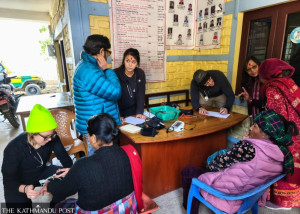Health
District hospitals struggle with budget cuts for family planning programmes
Experts warn funding shortfall could trigger a rise in unwanted pregnancies, unsafe abortions, and maternal and child deaths.
Arjun Poudel
District hospitals across the country lack the budget to provide family planning programmes, as the government has not allocated any funds to continue them for the current fiscal year.
Officials at the Ministry of Health and Population said they have already alerted relevant agencies, including the Ministry of Finance, about the budget cut, warning of serious repercussions including a rise in unwanted pregnancies, unsafe abortions, higher maternal and child mortality rates, among others.
“Health facilities won’t be able to continue family planning programmes due to budget cuts,” said Sarmila Dahal, chief of the Family Planning and Reproductive Health Section of the Family Welfare Division under the Department of Health Services. “We believe this might be an oversight and have brought it to the attention of relevant officials at the Health Ministry and Ministry of Finance.”
Health officials said that district hospitals throughout the country could soon run out of contraceptives such as condoms, pills, implants and emergency pills due to budget constraints. A potential shortage of these items will lead to a rise in unwanted pregnancies, unsafe abortions and maternal and neonatal deaths.
Multiple officials at the Ministry of Health complained that it has been too difficult to convince officials at the Finance Ministry about the importance of family planning programmes.
“Most officials think that the country’s population witnessed the lowest growth in eight decades, so continuation of family planning programmes is not necessary,” an official at the Health Ministry said on condition of anonymity, as he is not authorised to speak to the media. “But decline in population growth rate and providing family planning services are totally two different things.”
Nepal’s population growth rate stood at 0.92 percent per annum in the past decade, according to officials.
“The growth rate of the population has declined due to various factors, including internal and external migration,” said Dr Prakash Dev Panta, a demographer. “However, the fertility rate has not declined. If authorities stop family planning services, then again unwanted pregnancies, unsafe abortions, and maternal and neonatal deaths will rise, which have reduced over the years after making huge investments in the programmes.”
The UNFPA’s “State of World Population 2022” report titled, “Seeing the Unseen”, says half of the 1.2 million pregnancies in 2017 in Nepal were unintended and nearly 359,000 were aborted.
“Unintended pregnancy is a reality for millions each year, accounting for nearly half of all pregnancies,” said the UNFPA’s report. “Sixty percent of these unintended pregnancies will end in abortion.”
The UN agency’s report stated that the toll of these pregnancies is—and has for long been—unseen.
“Though we can estimate healthcare costs, monitor school dropout rates and project levels of workforce attrition due to unintended pregnancies, these only scratch the surface. No number could adequately represent the loss of life, agency and human capital that results from unintended pregnancies,” the report added.
Unintended pregnancy is often, tragically, linked to violence. The report shows how unintended pregnancies result in additional social and fiscal burdens, including greater demand for healthcare, unsafe abortion, loss of income and productivity, fewer resources for children in a family, and more fraught and unstable family relationships. Experts say that family planning services are directly linked to women's empowerment and the country's economic growth.
Every year, around 100,000 women undergo abortions in Nepal at legally authorised clinics and health facilities. Gynaecologists, however, say the actual number of abortions could be several times more than the government figure, as all abortions do not get reported, especially medical abortions.
Experts say halting family planning services abruptly will also be against the commitment of the government to enabling women and couples to attain the desired family size and have a healthy spacing of childbirths. This commitment includes improving access to rights-based family planning services and reducing the unmet need for contraceptives.
Last year, too, the Health Ministry, due to a fund crunch, borrowed 50,000 contraceptive implants from the United Nations Population Fund (UNFPA).




 10.12°C Kathmandu
10.12°C Kathmandu














